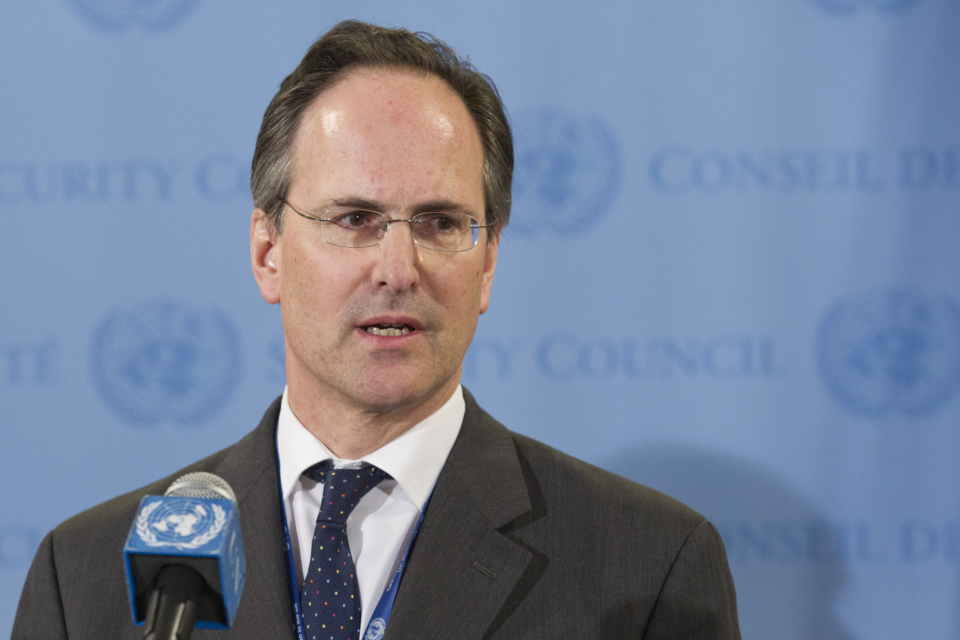"Terrorism continues to pose a grave threat to international peace and security"
Statement delivered by UK Ambassador Philip Parham, Deputy Permanent Representative of the UK Mission to the UN, to the UN Security Council meeting on briefings by Chairmen of Subsidiary Bodies of the Security Council.

Let me thank the Chairs of the Committees established pursuant to resolutions 1267/1989,1373, and 1540, Ambassadors Quinlan, Loulichki, and Kim for their comprehensive briefings today and for the effective way they have taken on leadership of those Committees.
Mr President,
Terrorism continues to pose a grave threat to international peace and security. No Member State can adequately respond to the challenges of terrorism by acting alone. Only through continued co-operation will the international community be able to tackle a problem which transcends geographical borders.
The United Nations has an important role to play. It is crucial that UN Member States strive to work together in an ever more collaborative and comprehensive manner. True collaboration requires breadth and depth of cooperation. A comprehensive approach requires making full use of all of the tools available to us.
The three Committees under discussion today are powerful tools. We fail in our responsibilities if we do not use them effectively, thoroughly and creatively to combat the terrorism threat.
Mr President,
Al Qaeda sanctions play an important role in the fight against terrorism by imposing targeted financial sanctions on Al Qaeda operatives, denying them arms, and restricting their travel – in other words limiting their ability to carry out terrorist acts.
The United Kingdom welcomes the recent unanimous adoption of resolution 2083 (2012) which, inter alia, extended the mandates of the Office of the Ombudsperson and the Monitoring Team.
The United Kingdom would like to pay tribute both Kimberley Prost and the Monitoring Team for their continuing exemplary work. We will continue to work with members of the Sanctions Committee, the Ombudsperson, and other interested parties to embed the changes agreed under the new resolution, to further enhance the Committee’s important work.
For the regime to be effective sanctions must be diligently implemented. We welcome recent work by the Committee, under Ambassador Quinlan’s leadership, to focus on implementation, including through consideration of outreach and technical support activities.
Mr. President,
The threat that chemical, biological or nuclear materials may proliferate to terrorists has been a growing concern to the international community over the last decade.
2014 will mark the tenth anniversary of Security Council resolution 1540, the only international instrument designed to prevent terrorists from acquiring these weapons of mass destruction. But the resolution will only ever be as effective as the will of the UN’s member states to implement its measures.
For that reason the United Kingdom urges states yet to meet their reporting obligations to do so. And we call on all states to design and execute national action plans to fight WMD trafficking.
We realise that the immense scale of the challenge means that governments and civil society must act in concert to fight the threat. So we urge states requiring support for implementation to approach the UNSCR 1540 Committee for assistance.
Our goal must be universal implementation of this resolution by 2014. And to achieve this the Committee, and its group of experts whose work we commend, must also play its part in continuing to seek opportunities to form partnerships with international organisations and regional agencies to have the resources to match these requests with assistance, including by issuing the Consolidated Assistance List as soon as possible.
Mr President,
The United Kingdom continues to welcome the 1373 Committees’ recognition of the need for States to pursue a co-operative approach to defeat terrorism. And we wish to mark our deep appreciation of Mike Smith’s very effective leadership of the Counter Terrorism Executive Directorate, as he nears the completion of his term.
Acts of terrorism, and the threat of such acts, touch on much of the UN’s work. It is important that all relevant components of the UN system work together to counter terrorist challenges, whilst avoiding duplication across its infrastructure. The UN’s CT strategy and the CT Implementation Task Force are key tools to this end.
And in particular today, the United Kingdom urges the three Committees, whose reports we have heard, to continue to intensify their collaborative efforts. We are grateful for Ambassador Kim for his briefing on the joint work of the Committees and encourage further collaboration along these lines.
The UN must also strive to work effectively as much as possible with other multinational organisations working on countering terrorism. For instance, we look forward to increased co-operation as a result of the regular EU-UN counter terrorism dialogue. The United Kingdom also recognises the important contribution which the Global Counter Terrorism Forum can make to tackling the terrorist threat and encourages the UN to continue its work with that body.
Mr. President,
The international community holds collective responsibility for tackling terrorism. Only through continued co-operation and recognition of the need to strengthen collaborative efforts will states be able to effectively counter terrorism.
Thank you, Mr President.